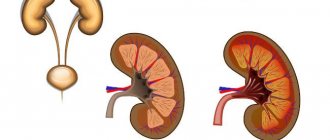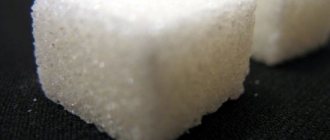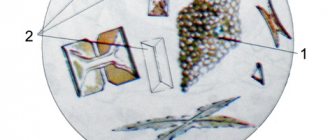In a healthy human body, glucose in urine has a fairly low percentage, that is, the norm of sugar in urine is 0.06-0.083 mmol per 1 liter of liquid. Any deviations from these indicators can be easily detected using general or biochemical analysis. An increase in level is not a disease, but serves as a symptom of any processes that occur in the patient’s body.
The level of sugar in urine is an important indicator of human health and the basis for lifestyle adjustments in diabetics.
Forms of glycosuria
A disease in which the filtering capacity of the kidneys decreases due to increased sugar in the urine is called glucosuria. Glucosuria has many forms:
- in the alimentary form, excess sugar in the urine occurs once, then goes away, provoked by the consumption of carbohydrate foods,
- emotional, provoked as a result of stress, more often occurs in pregnant women,
- chronic form, when sugar in the urine increases periodically, because synthesized in large quantities in the blood.
A characteristic indicator of incipient diabetes mellitus is an excess of glucose in the urine with a simultaneous decrease in glucose in the blood. This symptom is observed in diabetics who are dependent on insulin injections.
Sugar passes from the blood into the plasma through the renal tubules under the influence of the enzyme hexokinase. In diabetic patients, the enzyme hexokinase is produced by insulin. The patient's renal threshold decreases because of this.
Causes
If, after examination, sugar is found in a person’s urine, then the reasons for such a deviation can be completely different. To determine an accurate diagnosis, the doctor, depending on the degree of deviation in the indicators, prescribes additional tests, based on the results of which it will be possible to determine the pathology and select the most appropriate treatment.
Often, glucose in the urine is detected due to the following diseases:
- diabetes mellitus;
- meningitis;
- encephalitis;
- kidney nephrosis;
- various kidney diseases;
- pancreatitis;
- chronic form of pyelonephritis;
- poisoning with certain medications or certain substances;
- hemorrhagic stroke;
- malignant brain tumor;
- TBI.
In addition to diseases, such deviations in indicators can be a consequence of:
- systematic abuse of strong alcoholic beverages;
- severe stress and constant overwork;
- as a result of excessive physical exertion;
- constant consumption of fried foods or sweets;
- use of medicines containing antipyrine;
- various medicinal substances based on phenacetin or those containing saccharin;
- acetylsalicylic acid;
- excessive consumption of black coffee.
The presence of sugar in urine indicates health problems
In some situations, a urine test and excess glucose levels in it may be false positive or false negative, then the patient is prescribed a repeat test. It is also worth keeping in mind that in order to identify the cause, it is the primary analysis that is very important, since in the secondary the indicators can be completely different.
With such indicators, many patients wonder why there is absolutely no glucose in the secondary urine. This is explained primarily by the fact that primary urine is formed through a natural filtration process. Therefore, it is possible to identify any deviations only if an initial urine test is performed.
Diagnosis of sugar in urine
If the disease is accompanied by sclerotic pathology of the kidneys, then the level of sugar in the blood increases, and vice versa - a urine test shows the glucose level. The root cause of glucosuria is often diabetes mellitus. The disease is accompanied by the presence of acetone in the urine.
Glucosuria in diabetes mellitus is diagnosed when the amount of sugar in the blood decreases. A strong decrease in glucose is observed in diabetics with insulin dependence.
There are a number of diseases characterized by increased blood glucose, for example: exacerbation of pancreatitis, tumor or concussion, as well as hemorrhagic stroke (bleeding into the cranial cavity). Endocrine glucosuria is formed as a result of the release of adrenaline into the blood under extreme conditions for the body. Toxic glycosuria occurs due to poisoning of the body with toxic drugs, for example, the use of morphine or strychnine.
With a strong decrease in the renal threshold, renal glycosuria develops. Other reasons for the development of glucosuria may be pathologies in the functioning of the kidneys, which causes slow absorption of glucose.
Glucose in the urine exceeding the normal level indicates dysfunction in the body and a dangerous disease is developing. If you do not pay the necessary attention to glucosuria, it can subsequently lead to death.
Increased sugar in the urine will cause serious illnesses, such as: severe kidney disease, toxic poisoning of the body with poisons and chemicals, brain pathologies akin to stroke, damage to the cranial bone, epilepsy, renal tubular dysfunction, bacterial complications of the kidneys during inflammatory processes.
If the norm of glucose in the urine is exceeded, then the cause of the disease should be immediately identified in order to prescribe suitable therapy. If glucosuria is isolated, then there is no reason to be afraid. But if the urine test for sugar per day exceeds the norm at a constant level of more than 12 mmol per 1 liter, then this is already diabetes mellitus. It is especially important to monitor sugar and protein deviations during pregnancy, because exceeding these parameters is fraught with the development of pathologies in both mother and child.
Symptoms of High Glucose
Glucosuria due to diabetes mellitus may be accompanied by the following manifestations:
- there is an unquenchable thirst;
- drying of the oral mucosa appears;
- appetite increases or decreases;
- headaches appear;
- the frequency of urination increases and a large amount of urine is released;
- sleep is disturbed;
- blood pressure rises;
- weakness and irritability appear;
- the skin dries and itching occurs;
- sweating increases, especially at night;
- there is a sharp loss or weight gain.
Treating sugar in urine
A patient with glucosuria is advised to purchase a glucometer, which will help timely diagnose fluctuations in blood sugar. Glucosuria is more susceptible to people who drink alcohol, fatty or spicy foods in large quantities, as well as smokers.
Glucose fluctuations can occur in the body of any gender. Lifestyle directly affects the appearance of glucosuria; it can be a consequence of poor diet, aging of the body, and poor living conditions. High blood sugar is manifested by symptoms such as: constant drowsiness and thirst, frequent urination, feeling of chronic fatigue, dry skin, itching in the genital area, sudden weight loss. If you have one of the symptoms, you should consult a specialist for diagnosis.
If the determination of glucose in urine in children does not exceed 2.8 mmol per 1 liter, then this is considered normal, as in adults. Renal glucosuria in children can occur due to the abuse of sweets, fast food, which contains many dyes, preservatives, and other chemicals. More dangerous causes of glucosuria may be: infectious meningitis, encephalitis. If the child’s glucose level is too high, the pediatrician will refer the child for re-diagnosis.
It is necessary to adjust the child’s diet by determining which foods provoke an increase in sugar. Sometimes glucosuria in children appears due to taking antibiotics, an excess of vitamin C, or eating a large amount of sweets on the eve of testing.
Sugar levels in adults and children
In a completely healthy person, there should be no glucose present in the urine. Sugar may be present in moderate amounts in the blood, but not in the urine. But there are still deviations in which sugar is still detected in urine, and if these indicators exceed the established norm, then the patient is inevitably prescribed additional tests.
A completely healthy person should not have glucose in his urine.
If glucose is still found in a person’s urine, then its levels should be in the range from 0.6 to 0.08 mmol per liter of urine. If for some reason these indicators differ significantly from the norm, then in this case one can suspect that a serious pathological process is developing in the body.
The level of sugar in urine in men, women and children is no different from all the indicators listed above, which in turn indicates that the level of glucose in urine is the same for absolutely all people. I would also like to note that blood sugar levels do not even change in cases where a woman is carrying a child.
How to collect urine
There are three ways to collect urine for testing. The first involves the study of a one-time urine sample. The second is the boron of daily urine output. And the third is collecting urine at different times of the day, except in the morning. In order to get a correct analysis, you need to prepare before collecting urine, for example, you should not take diuretic medications, teas or drink heavily.
Exclude sweets, alcohol, as well as fatty, spicy and salty foods. The procedure for collecting urine for glucose looks like this: purchase a large-volume container, be sure to pour out the morning urine, and the rest of the time you should collect the urine in this container. Having received urine per day, it is mixed and poured into a 200 ml container for testing. In case of a positive test, you need to retake the test several times to be sure.
After confirming the diagnosis, the patient’s diet is adjusted, carbohydrate foods, fatty foods, hot spices, alcohol-containing drinks (including low-alcohol drinks), and soda are excluded. A proper diet, daily routine, and moderate physical activity help reduce sugar in urine.
Bringing indicators back to normal
Let's say a repeat test shows a lot of sugar in the urine. What does it mean? At a minimum, this indicates that not everything is in order with the body. The doctor must notify the patient about this and advise him to adjust his diet. This is the simplest and most effective way to solve this problem. If you remove all carbohydrates, spicy and fatty foods, as well as alcohol (including beer) from your daily diet, then over time the glucose level in urine may return to normal.
You can also lower your sugar levels with a strict daily and sleep schedule, physical activity and quitting smoking. If a person already leads an active lifestyle, then before the tests you need to reduce your activity, which will allow you to get more accurate results. If the patient correctly follows all the doctor’s instructions, but upon repeated analysis the glucose level does not decrease (or even increases), then additional examinations will have to be performed to identify pathology.
Traditional methods of treating sugar in urine
Folk remedies relieve symptoms of the disease, especially for diabetics. Such preparations include herbs, infusions of them, and decoctions of blueberries (leaves). The infusion is prepared in a thermos filled with boiling water in a volume of 3 tablespoons of leaves.
Infuses for about four hours. You can take it anytime without any additives. Another folk remedy is fermented baked milk with the addition of cinnamon, which is good for reducing sugar in the urine in diabetes mellitus. Another useful product is beans soaked in water for 24 hours; they should be taken raw.
Acupressure is also good for diabetes - a good replacement for drug therapy. The massage is performed by a specialist by pressing on points located on the arms, legs, head and back. The procedure is prescribed by the doctor after consultation.
Treatment with diet
First of all, if there is a large amount of sugar in the blood, it is necessary to determine the cause of the disorder. If this is due to the consumption of large amounts of carbohydrates, then it is advisable to abandon them.
It is necessary to increase the amount of water and regularly replenish the body with the necessary microelements. This should be done, since glucose in the child’s urine ceases to normally nourish the internal organs and brain.
Rules:
- You need to eat often, but in small portions.
- It is recommended to completely or partially limit foods containing carbohydrates, including sweets.
- You need to take medications that contain potassium.
- If the body is significantly dehydrated, it is necessary to replenish it with a dropper.
- Food that will help relieve the work of the pancreas.











